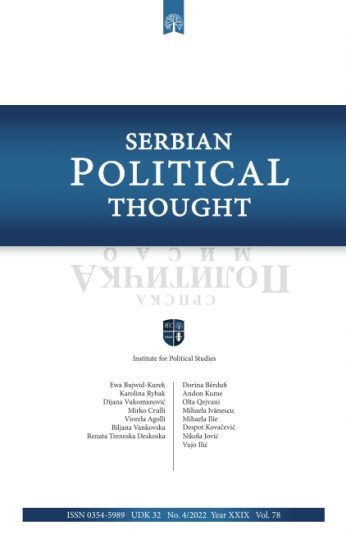Main topic
spt2/2015
Demographic Circumstances in Serbia: Exaltation and Resignation as two Extremes of the National Identity Crisis
Abstract
One of the far-reaching consequences of Serbia’s involvement in crucial global events and regional conflicts of the twentieth century was its demographic re-composition. The unstable geopolitical situation in the Balkans, which was intentional, drove the people living there into confronting situations, in which they had to act accordingly. The politics of the elite that ran the country (mis)used various models for dealing with its population– from traditionalism and sacrificing, through migration and colonization, to modernization and cosmopolitanism. Each of these models has had its highs and lows. The extremes of these models testified more to senseless wanderings than to a responsible demographic policy. This resulted in an unenviable and almost irreversible demographic decline in Serbia. Unlike today, in the early twentieth century the Serbian nation was considered as one of the youngest in the world, relative to its population size. In this paper we shall present numerous warnings of our contemporaries that the issue of preserving the population is far more important than short-sighted social ideas of the emotionally driven. Unfortunately, this attitude is usually interpreted as an unpatriotic act of dubious intentions. It often took very little time to go from exaltation to resignation. Events have shown that the identity often lacked stability. The irrational elements in creating the identity in Serbia has been and remained one of the greatest challenges of a responsible population policy.
References
- Bigović, R. (2010) Crkva u savremenom svetu. Beograd: Službeni glasnik.
- Bogdanović, D. (1991) Istorija stare srpske književnosti. Beograd: Srpska književna zadruga.
- Borozan, Đ. (2003) Demografski identitet Srba i Hrvata u Jugoslaviji prema popisu stanovništva 1921-1991, [online]. Available at: http://www.cpi. hr/download/links/hr/7238.pdf, [Accessed 22 June 2014].
- Besermenji, S., Marković, S. (2012) “Iskušenja etnofiletizma u religijskim motivima političke misli kod Srba”. Politička revija, 34(4): 241-267.
- Bećković, M. Intervju. Novosti, februar 2015.
- Cvijić, J. (1907) O nacionalnom radu, Beograd.
- Ćosić, D. (2009) Srpsko pitanje u 20. veku. Beograd: Službeni glasnik.
- Dvorniković, V (1995) Borba ideja. Beograd: Službeni list SRJ.
- Dedijer, J. (1910) Naš nacionalizam. Sloga: Sombor.
- Dimić, LJ. (1998) Srbi i Jugoslaviji. Beograd: Stubovi kulture.
- Đurić, M. (1997) Kulturna istorija i rani filozofski spisi. Beograd: Zavod za udžbenike i nastavna sredstva.
- Đurić, M. (2009) Humanizam kao politički ideal. Beograd: Službeni glasnik, sabrani spisi, knjiga 2.
- Đurić, M. (2009) Stihija savremenosti. Beograd: Službeni glasnik, sabrani spisi, knjiga 5.
- From, E. (1989) Bekstvo od slobode. Beograd: Nolit.
- Grujić, R (1995) Pravoslavna srpska crkva. Beograd: Izdavačka knjižarnica Gece Kona (reptint) / Prosveta.
- Hobsbaum, E. (2002) Doba ekstrema, Istorija kratkog dvadesetog veka 1914-1991. Beograd: Dereta.
- Jerotić, V. (2004) Vera i nacija. Beograd: Besjeda, Ars libri.
- Jovanović, S. (2005) Kulturni obrazac. Beograd: Stubovi kulture.
- Jovanović V. (1863) Srpski narod i istočno pitanje. Novi Sad.
- Karlajl, T. (1903) O herojima. Beograd: Srpska književna zadruga.
- Ković, M. (2003) Zapadnoevropske političke ideje u ‘’Srpskom književnom glasniku”: 1901-1914. Beograd: Filozofksi fakultet, magistarski rad.
- Lubardić, B. (2009) Justin Ćelijski i Rusija. Novi Sad: Beseda.
- Male, A. (1999) Dnevnik sa srpkog dvora 1892-1894. Beograd: Klio.
- Majendorf, DŽ. (2008) Vizantijsko bogoslovlje. Kragujevac: Kalenić.
- Malthus, T. (1798) An Essay on the Principle of Population, [online]. Available at http://www.gutenberg.org/files/4239/4239-h/4239-h.htm [Accessed 7. May 2015] .
- Marković, S. (2006) “Nacionalni identitet Srba u XIX i početkom XX veka”, Zbornik Matice srpske za društvene nauke, (120): 235 -252.
- Marković, S., Besermenji, S. (2011). “Kulturni nacionalnizam” u političkoj misli kod Srba početkom 20. veka”, Srpska politička misao, 34(4): 377394.
- Marković, S. (2015) “Hipokrizija kao pretendent na arhetip nedorečenog u političkoj misli kod Srba”. Srpska politička misao, 47(1): 57-70.
- Orbin M. (1968) Kraljevstvo Slovena. Beograd: Srpska književna zadruga.
- Palavestra, P. (2013) Istorija moderne srpske književnosti. Beograd: Službeni glasnik.
- Pekić, B. (1991) “Kompromis – drugo ime za život”. Borba, 06. 1991.
- Pitulić, V. (2012). ‘’Kosovska bitka između istorijskog izvora i epske legende’’. Zbornik radova Filozofskog fakulteta, Kosovska Mitrovica, 42(2): 99112.
- Spasovski, M., Kicošev, S., Živković, D. “The Serbs in the Former SFR of Yugoslavia”, [online]. Available at: http://www.rastko.rs/istorija/srbi- balkan/spasovski-kicosev-zivkovic-sfry.htm [Accessed 2. May 2015].
- Sigmund, F. (1970) Odabrana Novi Sad: Matica srpska, knjiga 5.
- Stojiljković, Z. (2012) “Serbia between Electoral Authoritarianism and Consolidated Democracy”. Serbian political tought, 6(2): 5-23.
- Stojanović, S. (2014) “Charismatic Dimension of Political Leadership: The Case of Serbia”. Serbian political thought, 9(1): 19-49.
- Ranke, L. (1991) Srpska revolucija. Beograd: Srpska književna
- Randelj, Đ. (2014) Patrijarh Pavle, svetac koga smo poznavali. Beograd: NIN.
- Rezultati popisa stanovništva Kraljevine Srba, Hrvata, Slovenaca 1921, [online]. Available at: http://pod2.stat.gov.rs/ObjavljenePublikacije/G1921/Pdf/pdf.
- Rezultati popisa stanovništva Kraljevine Srba, Hrvata, Slovenaca 1931, [online]. Available at http://pod2.stat.gov.rs/ObjavljenePublikacije/G1931/pdf/pdf.
- Rajs, A. (2005) Čujte Srbi, čuvajte se sebe. Beograd: Srpski privredni i kulturni klub.
- Uporedni pregled broja stanovnika 1948, 1953, 1961, 1971, 1981, 1991, 2002. i 2011. [Online]. Available at: http://pod2.stat.gov.rs/ObjavljenePublikacije/Popis2011/Knjiga20.pdf.
- Šešelj, V (2002) Ideologija srpskog Srpska radikalna stranka, Beograd.
- Todorova, M. (1999) Imaginarni Beograd: XX vek.
- Velimirović, N. (2000) Misli o dobru i zlu. Linc: Srpska pravoslavna crkvena opština.
- Vuletić, V. (2007) “Srbija i Srbi u očima Rusa”. Letopis Matice srpske, (488)4: 608-617.

